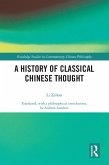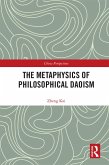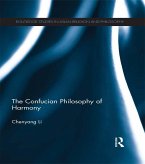Dieser Download kann aus rechtlichen Gründen nur mit Rechnungsadresse in A, B, BG, CY, CZ, D, DK, EW, E, FIN, F, GR, HR, H, IRL, I, LT, L, LR, M, NL, PL, P, R, S, SLO, SK ausgeliefert werden.
"Li Zehou is arguably China's most important contemporary philosopher. In a generation in which we have experienced a precipitous rise of Chinese influence on the world order, we are from a contemporary philosophical vantage point offered this sustained reflection on the evolution of this antique Chinese philosophical tradition that brings its most prominent figures and themes into the present philosophical discourse. Li Zehou reinterprets and re-conceptualizes major ideas and concepts within the broad compass of this tradition, and replete with his own philosophical speculations, makes them available as a resource for a changing world cultural order." - Roger T. Ames, Peking University, China
"Presented here in English for the first time, Li Zehou's A History of Classical Chinese Thought stands as a major work in twentieth-century Chinese philosophy, one that remains highly relevant to contemporary East-West dialogue. Lambert's studious translation captures both the delicacy and breadth of the author's mind, affording readers a new appreciation of what it means to 'do' Chinese philosophy." - Jim Behuniak, Colby College, USA
"Li Zehou is the most outstanding but controversial philosopher in contemporary China. He was the youngest protagonist of the 'aesthetic debate' in the new born socialist China in 1950s. He came back after the Cultural Revolution with his idiosyncratic elucidation on Marxism and Kantian philosophy to become the flag bearer leading the 'aesthetic fever' and the 'cultural fever' throughout the 'New Enlightenment' period of 1980s. A History of Classical Chinese Thought, a major work in 1980s, exhibits Li's unique interpretation on Chinese traditional thoughts, in particular, Confucian philosophy, which ushered the Confucian turn in China today, eventually makes Chinese philosophy resonate with Western philosophy." - Tsuyoshi Ishii, University of Tokyo, Japan









